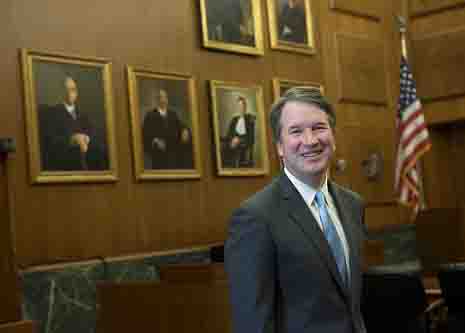
Wikimedia Commons
President Donald Trump on Monday called for a “full process” in the investigation of a nearly 40-year-old sexual assault allegation against Yale alumnus and Supreme Court nominee Brett Kavanaugh ’87 LAW ’90.
But even as the allegation has sent shockwaves through American politics, Yale faculty members and administrators who voiced support for Kavanaugh after he was nominated for the high court have mostly remained silent.
One exception is Akhil Reed Amar ’80 LAW ’84, a Yale law professor who penned an op-ed defending Kavanaugh in The New York Times over the summer and who testified before the U.S. Senate Judiciary Committee last week. Asked on Monday whether he believes the allegation should be investigated before a confirmation vote, Amar said that it should.
“Yes, this seems the most fair way to proceed — for the Professor and the Judge, for the Senate, and for the American people — even though the process may well be painful for the participants,” Amar, who taught Kavanaugh in the 1980s, wrote in an email.
The once certain nomination of Kavanaugh was put in a precarious position over the weekend after a psychology professor named Christine Blasey Ford went public with the accusation that Kavanaugh attempted to sexually assault her at a party while they were in high school in Washington, D.C., in the 1980s. In a story published in the Washington Post on Sunday, Ford said Kavanaugh pinned her onto a bed and groped her, placing his hand over her mouth to muffle her shouts. She eventually managed to escape, she said.
Kavanaugh and Ford will testify in front of the Senate Judiciary Committee next Monday in a hearing open to the public. The committee had originally scheduled a vote to move the confirmation process to the full Senate for Thursday. That vote has been postponed.
Trump made his remarks about the confirmation process at the White House on Monday morning.
“We want to go through a full process. I have great confidence in the U.S. Senate and in their procedures and what they’re doing,” Trump said. “I’d like everybody to be very happy. Most importantly, I want the American people to be happy. … If it takes a little delay, it’ll take a little delay. It shouldn’t certainly be very much.”
With the midterms fast approaching, a delay could pose problems for Kavanaugh’s confirmation. Republicans, who overwhelmingly support the nomination, hold a slim one-vote advantage in the Senate. A change to the body’s makeup after the November elections could jeopardize his nomination.
This week, two of Kavanaugh’s ex-girlfriends, Maura Kane and Maura Fitzgerald, defended him in a statement released by a right-leaning publicity firm, CRC Public Relations. And the Wall Street Journal released an editorial arguing that the accusation would corrupt the #MeToo movement with partisanship.
“Letting an accusation that is this old, this unsubstantiated and this procedurally irregular defeat Mr. Kavanaugh would also mean weaponizing every sexual assault allegation no matter the evidence,” the editorial stated.
Asked this weekend whether the Yale Law School stood by a press release it issued this summer praising Kavanaugh, law school spokeswoman Jan Conroy simply said the release did not constitute an endorsement. And apart from Amar, none of the five Yale professors — including law school Dean Heather Gerken — have responded to requests for comment on the allegation against Kavanaugh.
Jordan Cozby ’20, the president of the Yale College Democrats, said that the Supreme Court confirmation process ought to halt while the accusations against Kavanaugh are examined.
“I would say it is completely unwarranted for anything to continue with the nomination process while these allegations are going forward,” Cozby said. “And I think it’s troubling that the nomination has made it this far.”
At Yale, Kavanaugh lived in Ezra Stiles College and belonged to the Delta Kappa Epsilon fraternity.
Keshav Raghavan | keshav.raghavan@yale.edu







